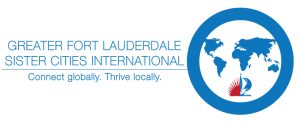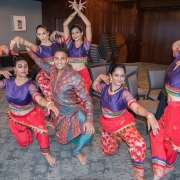Cap-Haitien is a city approaching to one million people on the north coast of Haiti. It is the capital of the North department. Due to its proximity to wide Caribbean beaches to its northwest, Cap-Haitien has traditionally been a resort and vacation destination for many vacationers. The central area of the city is located between the Bay of Cap-Haitien to the east, and nearby mountainsides to the west. A popular destination on Cap Haitien is the Citadelle and Sans Souci. The view offered by La Citadelle is very impressive and breathtaking: Cuba can be spotted on a clear day. Sans Souci was King Henri Christophe`s royal palace. It was the administrative capital and is located in the town of Milot just down the mountain from the Citadelle Laferrierre. Sans Souci Palace also includes a printing shop, garment factories, a hospital, schools, a distillery chapel and military barracks.
Cap Haitien, is the second largest city in Haiti. Over the years, GFLSCI has been organizing humanitarian and environmental programs to benefit the citizens of Haiti, the poorest country in our western hemisphere. Some of the GFL Sister Cities most recent programs are described below including the A Dollar A Tree Program, allowing reforestation of the barren hillsides, preventing mudslides during the rainy season and the the Farm Tools for Haiti Program, empowering impoverished individuals to grow crops for the hungry.
In early 2009, Fort Lauderdale Sister Cities Board of Directors voted to make our Sister City, Cap Haitien, Haiti, the special focus at all our Fort Lauderdale events for the entire year. This provided the Environmental Committee with a spotlight to promote our project in the community. Funds raised at Sister City events gave us the initial resources to launch the program. Shortly after, several private citizens and schools gave important contributions with which we continued the program. Now we had enough resources to accomplish vital elements of the project that we did not foresee in the initial stages.
— Projects —

The “Dollar A Tree” Program
Greater Fort Lauderdale Sister Cities International’s Environmental, Humanitarian and Haiti Committees have joined forces with One Village Planet (www.onevillageplanet.org) to combat the environmental crisis in Haiti. The Committees have created a program, which will allow one tree to be planted in different areas in Haiti for every US dollar donated. The Program, called “A Dollar A Tree”, has the ambitious goal to reforest Haiti by planting 23 million trees per year.
Description of the benefits derived from this sister cities program:
- The pilot project has shown that it is possible to raise seedlings and plant young trees for less than $1 per tree, far less than it costs most organizations currently working in Haiti.
- We now have a successful prototype reforestation program which we and other community based and non profit organizations can duplicate as funds permit throughout the country of Haiti.
- Several rural communities similar to those throughout Haiti are more informed about the need for environmental restoration and see the actual benefits of both land and coastline reforestation.
- There is a real sense of pride among the populations of the communities we have worked in, especially since they were empowered to feel it was their own project.

The Haiti Earthquake Relief Fund
On January 12th, 2010, The poorest country in the Caribbean was hit by a 7.0 earthquake which is reported as the strongest earthquake to affect Haiti in over 200 years. A final death toll has not been reported yet, but The American Red Cross estimates that about 3 million people were affected by this disaster. Greater Fort Lauderdale Sister Cities International is starting a Haiti Disaster Relief Fund to help the victims of the earthquake. Please help us by making your donation today. In the immediate aftermath, Greater Fort Lauderdale Sister Cities International is allocating the funds to water purification systems in the hardest hit areas. Funds will also be used to help rebuild areas devastated by the earthquake in association with the Clinton Bush Haiti Relief Fund and One Village Planet.

The Haiti Earthquake Relief Fund
On January 12th, 2010, The poorest country in the Caribbean was hit by a 7.0 earthquake which is reported as the strongest earthquake to affect Haiti in over 200 years. A final death toll has not been reported yet, but The American Red Cross estimates that about 3 million people were affected by this disaster. Greater Fort Lauderdale Sister Cities International is starting a Haiti Disaster Relief Fund to help the victims of the earthquake. Please help us by making your donation today. In the immediate aftermath, Greater Fort Lauderdale Sister Cities International is allocating the funds to water purification systems in the hardest hit areas. Funds will also be used to help rebuild areas devastated by the earthquake in association with the Clinton Bush Haiti Relief Fund and One Village Planet.
Other Environmental Projects
As the Cap Haitien committee members and the One Village Planet agronomists worked in and became better acquainted with the villages, they began to learn from the population more about specific needs in those communities. In Acul, it was the fishermen who complained about the declining fish population. In Derac, we learned that they had not had potable water or electricity available in the town for many years. Brackish water they had once used to water their family gardens had also become scarce and their traditional farming methods were failing them.
In addition to the mangrove planting projects, the Sister Cities committee and One Village Planet have built a community-based aquaculture facility. With technical assistance from marine biologist Justin Freedman, One Village Planet constructed a grow-out pen in a sea grass habitat adjacent to one of its mangrove restoration areas. 118 juvenile queen conch were collected, weighed, measured and tagged with the assistance of local children and members of the Fishing Cooperative. The conch were placed in the pen and monitored, weighed and measured periodically. When the conch were of reproductive age, some were kept to stock the waters. Others are marketed to local restaurants and hotels. This will become a sustainable enterprise for the Fishing Cooperative and can be duplicated in other coastal fishing villages. In the town of Derac, we addressed the water shortage.
A combination of additional funds raised and in kind contributions enabled us to dig a deep potable water well, buy a generator to power the pump and enough pipe to bring the water to the community. Townspeople provided volunteer labor to dig the trench and lay the pipe over the two mile distance across farmlands from the well to the town. Each house pays a monthly fee to fund maintenance and fuel costs. We expect to see a considerable improvement in the health of the inhabitants as a result of the only good water they have had in many years.
Thanks to continued funding through Sister Cities events and contributions from the community, we were able to address some of those needs.






